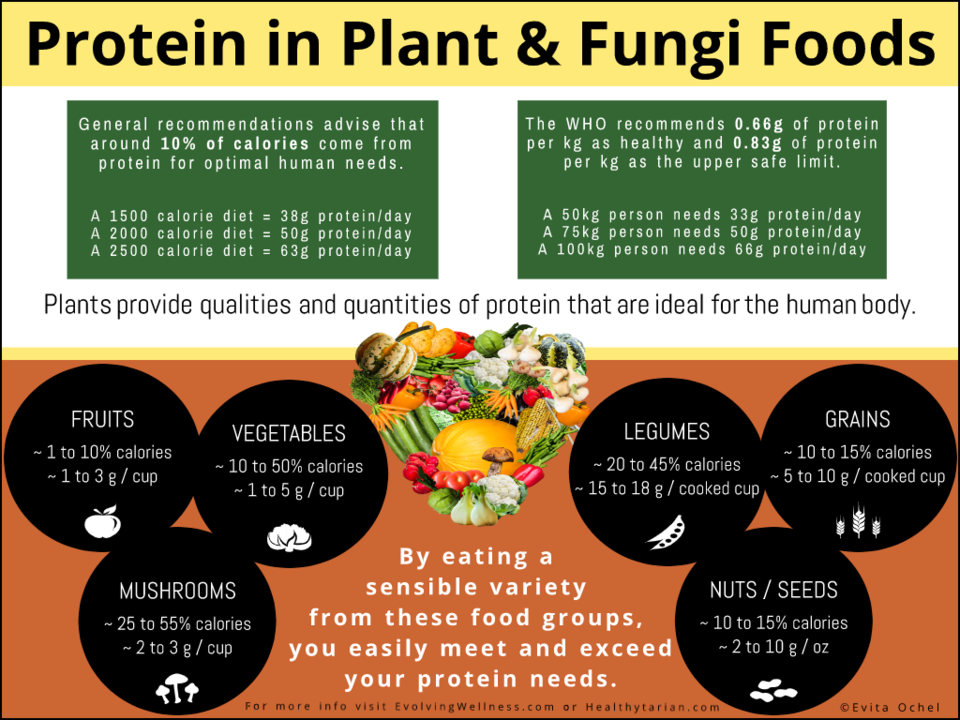Healthytarian Minutes with Evita Ochel. This episode shares about protein, its quality, and how much protein different plant foods have unsaturated fats.
Learn how to eat an optimal diet for your health and weight with the Eat Real Food: Whole-Food, Plant-Based Eating online video program.
Video Transcript
When food is whole, unrefined, and unprocessed, it provides us with all the nutrients we need, like carbohydrates, fats, proteins, vitamins, and minerals, assuming that we eat enough for our needs, of the right foods. For the human body to thrive, this means eating a diet based on, or solely composed of, whole plant foods.
Unfortunately, many myths and misguided ideas over the years have led us to form faulty beliefs about the nutrition potential of plant foods. This is most strongly seen in our perceptions about protein and plant foods, with common fears revolving around plants not having enough protein or the right quality of protein.
However, nothing could be further from the truth, as all whole plant foods contain the right quantity and quality of protein for us to thrive. There is no counting needed, no supplementation needed, and no special combining needed. In addition, protein from plant foods is less acid-forming, than that from animal foods, does not come with a high unhealthy fat composition, but instead comes with a high healthy fiber composition, and does not trigger our immune and inflammatory responses, the way animal protein does.
To meet and exceed our human needs for protein, we only need around 10% of our daily calories to come from protein, and more is not better, as high protein diets increase our risk of numerous health conditions.
Here are the general ranges of protein compositions, as a percent of calories, in plant and fungi foods:
- Fruits: 3 - 13% protein
- Vegetables: 15 - 55% protein
- Legumes: 20 - 45% protein
- Grains: 10 - 15% protein
- Nuts / Seeds: 10 - 15% protein
- Mushrooms: 25 - 55% protein
As you can see, there is more than enough protein in plant foods, which supply us with all the essential and non-essential amino acids. However, to have a healthy relationship with our food, we must stop seeing it and thinking of it in terms of isolated nutrients and numbers, and embrace the perfection of whole food, as intelligently created by nature for us. When you eat enough of the right foods, you get the right nutrients.
Related Resources
For further information about this topic and to learn more about protein myths, quantity, quality, and different food sources consider any or all of the following resources:
- Protein in Plant Foods by Evita Ochel ~ Healthytarian
- 8 Protein Myths About Plant and Animal Sources by Evita Ochel ~ Evolving Wellness
- Protein: Too Much? Too Little? a recorded online video class by Evita Ochel
- Changing Protein Requirements by Michael Greger, MD ~ Nutrition Facts
- Protein: Everything You Think You Know is Wrong by David L. Katz, MD
- Setting the Record Straight by Michael Bluejay
- The Protein Myth ~ Physicians Committee for Responsible Medicine
- Plant Foods Have a Complete Amino Acid Composition by John McDougall, MD ~ American Heart Association
- How Plant Protein Wins Over Animal Protein ~ Joel Fuhrman, MD
- The Myth of Complementary Protein by Jeff Novick, MS, RD ~ Forks Over Knives
- ‘Complete’ and ‘Incomplete’ Protein is Complete BS by Ryan D. Andrews, RD, CSCS ~ Furthermore Equinox
- Vegetarian Protein Is Just As ‘Complete’ As Meat, Despite What We’ve Been Taught by Kristen Aiken ~ Huff Post
- 7 Ways Animal Protein is Damaging Your Health by Sofia Pineda Ochoa, MD ~ Forks Over Knives
- Plant vs. Animal Protein and Heart Disease by Michael Greger, MD ~ Nutrition Facts
- The No-B.S. Guide to Vegan Protein by Courtney Davison ~ Forks Over Knives
- Where Do You Get Your Protein? by John McDougall, MD
- Where Do You Get Your Protein? by Alan Goldhamer, D.C. ~ T. Colin Campbell Center for Nutrition Studies
- Protein in the Vegan Diet by Reed Mangels, PhD, RD ~ The Vegetarian Resource Group
- Do Vegetarians Get Enough Protein? by Michael Greger, MD ~ Nutrition Facts
- Are BCAA (Branched Chain Amino Acids) Healthy? by Michael Greger, MD ~ Nutrition Facts
- Protein and Amino Acid Requirements in Human Nutrition - World Health Organization (2007)
- Plant proteins in relation to human protein and amino acid nutrition ~ American Journal of Clinical Nutrition; May 1994 vol. 59 no. 5 1203S-1212S
- Meta-analysis of nitrogen balance studies for estimating protein requirements in healthy adults ~ American Journal of Clinical Nutrition; January 2003 vol. 77 no. 1 109-127
Comments, Questions & Feedback
To share any comments, questions or feedback, please visit the video’s YouTube page.

